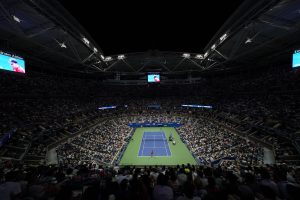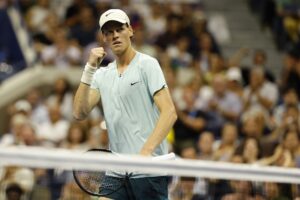There was an unmistakable buzz during tennis’ most recent off-season. The missing pieces of the jigsaw would soon all be back as Novak Djokovic, Andy Murray, Stan Wawrinka, Milos Raonic and Kei Nishikori looked to be triumphantly returning to the ATP Tour. The gang would be back together.
One by one though, for one reason or another, this Australian Open dream turned into a nightmare. Whether it was Andy Murray’s pre-tournament withdrawal and hip surgery or Stan Wawrinka’s concerning loss to Tennys Sandgren, any optimism quickly faded.
While a handful of these players threw their weight into the Australian Open draw, Kei Nishikori took a path much less travelled. It came as quite a shock to tennis fans and media when Nishikori announced he would not be playing the Australian Open but would instead by dropping down to compete on the ATP Challenger Tour.
Embed from Getty Images
Kei Nishikori’s surprise Challenger Tour comeback
It is not unreasonable to say that his approach was unconventional. Few players of his calibre have, in recent memory, delved into the depths of the Challenger circuit. Among the plethora of comebacks, it was an utterly unique strategy.
It didn’t appear all too successful initially. His low-key return at the Newport Challenger was far from a triumph. Drawing Dennis Novikov in the opening round, Nishikori sluggishly exited in three sets. It seemed the gamble had not paid off.
Undeterred by this setback, Nishikori had another crack at the Challenger circuit, this time in Dallas. Intriguingly, Novikov was once again his first-round opponent. History would not repeat itself. Nishikori prevailed this time, winning in straight sets.
This first win would be the start of a title-winning run for the Japanese icon. After dismantling Novikov, four more wins hastily followed as he romped through to the title. The Dallas title was just a bonus for Nishikori though in reality. The real success came in the evident improvement in the quality of his tennis.
“I started to feel confident in my strokes,” Nishikori exclaimed. “I’m getting closer to ideal (play_ now that I’m able to play better.” The Japanese star went on to say “I can’t say that I’m 100 percent, but I’m playing a lot of good tennis.”
That is ultimately the key difference between him and the other injury returners. The way he has returned has guaranteed him game time, while not pushing his body to severe extremes.
Embed from Getty Images
Has Kei Nishikori’s outsmarted his comeback rivals with his reserved approach?
The contrast with those who returned in Australia is stark. Novak Djokovic may have reached the fourth round of the Australian Open, but looked far from comfortable throughout the tournament. Was the risk worth it? Arguably not. Since departing Australian Djokovic has undergone a “minor medical intervention”. Presumably surgery on his elbow.
How about Stan Wawrinka? While Djokovic seemed more rusty than outright injured, Wawrinka’s Australian Open was a mess. His second round match against Tennys Sandgren made for uncomfortable viewing. Not only was the three-time Grand Slam playing terribly, he was in noticeable agony throughout the contest. A hefty scar protruding from his knee signalled that he has had significant work done and it certainly seems as though he was too hasty in his return to the court.
The question you have to ask about both of their returns is, why make it at the Australian Open? There answer is obvious on paper. It’s a Grand Slam and is, therefore, the pinnacle of the sport. It is one of the four most prestigious events in tennis and is the one that gets you bookmarked in tennis history if you win.
But logic and common sense have to play its part – and they were never going to win. It a brutal, attritional Grand Slam, played in ferocious humidity in a best-of-five format. Hardly smart, or ideal conditions with which to make comebacks from long, potentially career-damaging injuries.
Embed from Getty Images
Will Kei Nishikori return to the top-10?
Kei Nishikori, unlike Djokovic and Wawrinka, seems to have angled his comeback from a more long-term perspective. His acceptance that he was not prepared to contest the Australian Open may stand him in good stead throughout the rest of the season. It would not be the biggest surprise if he is ranked higher than both Djokovic and Wawrinka by the end of the year purely because he managed his recovery better. His strategy means that he can progress at his own pace, build his confidence and his physicality back up again from scratch.
Results have already gone his way as his Challenger title clearly demonstrates. The next step is to replicate this feat on the lower rungs of the ATP circuit. His first opportunity begins at the New York Open next week, making its debut on the tour as a replacement for the Memphis Open. As Nishikori has proved, it doesn’t matter if he loses in the first round. He could always come back and win another event the next week instead.
Providing he has managed his injury as well as it appears, Kei Nishikori will be back in the top-10 before too long. His repetitive, almost computer-game-like style mean he is a nightmare for most players ranked outside of the top-5. With Hyeon Chung stealing the limelight as the Far East’s golden boy for now as well, his lowkey comeback has plenty of promise. Keep half an eye on Kei Nishikori because he’s going to start sneaking up the rankings to his rightful place.
Main Photo:
Embed from Getty Images






